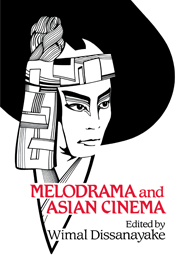Book contents
- Frontmatter
- Contents
- List of contributors
- Acknowledgments
- I Introduction
- II Melodrama / subjectivity / ideology: Western melodrama theories and their relevance to recent Chinese cinema
- III Symbolic representation and symbolic violence: Chinese family melodrama of the early 1980s
- IV The Goddess: Reflections on melodrama East and West
- V Melodrama as historical understanding: The making and unmaking of communist history
- VI Melodrama, postmodernism, and Japanese cinema
- VII Inscribing the subject: The melodramatization of gender in An Actor's Revenge
- VIII Insides and outsides: Cross-cultural criticism and Japanese film melodrama
- IX Psyches, ideologies, and melodrama: The United States and Japan
- X Negotiating the transition to capitalism: The case of Andaz
- XI The concepts of evil and social order in Indian melodrama: An evolving dialectic
- XII Politics of melodrama in Indonesian cinema
- XIII Power, pleasure, and desire: The female body in Filipino melodrama
- XIV The register of nightmare: Melodrama as it (dis)appears in Australian film
- XV Overview: What is American about film study in America?
- Index
XII - Politics of melodrama in Indonesian cinema
Published online by Cambridge University Press: 05 June 2012
- Frontmatter
- Contents
- List of contributors
- Acknowledgments
- I Introduction
- II Melodrama / subjectivity / ideology: Western melodrama theories and their relevance to recent Chinese cinema
- III Symbolic representation and symbolic violence: Chinese family melodrama of the early 1980s
- IV The Goddess: Reflections on melodrama East and West
- V Melodrama as historical understanding: The making and unmaking of communist history
- VI Melodrama, postmodernism, and Japanese cinema
- VII Inscribing the subject: The melodramatization of gender in An Actor's Revenge
- VIII Insides and outsides: Cross-cultural criticism and Japanese film melodrama
- IX Psyches, ideologies, and melodrama: The United States and Japan
- X Negotiating the transition to capitalism: The case of Andaz
- XI The concepts of evil and social order in Indian melodrama: An evolving dialectic
- XII Politics of melodrama in Indonesian cinema
- XIII Power, pleasure, and desire: The female body in Filipino melodrama
- XIV The register of nightmare: Melodrama as it (dis)appears in Australian film
- XV Overview: What is American about film study in America?
- Index
Summary
Some years ago I was on a panel discussing Asian cinemas at the Melbourne Film Festival with Tuti Indra Malaon, arguably one of Indonesia's greatest melodramatic actresses, and Teguh Karya, probably Indonesia's most famous living director. The festival had, the previous night, shown their film Ibunda (Mother) (Teguh Karya, 1985), starring Tuti in the title role as the mother. One Australian woman, for whom this was the first encounter with Indonesian cinema, speaking from the floor thanked Tuti and Teguh profusely for making this film, which she said had “entered her dreams last night.” She was grateful because of the way in which the awful conflicts were all magically resolved in the last crucial minutes of the film. In her effusive endorsement of Ibunda, she had opened up the vexed question of the source of the melodramatic pleasure: Does it lie in the expressive excess of conflict (and its attendant sorrow, loss, and pain) or in the reassuring escapism of happy endings? Is it a genre of acquiescence or of resistance, of expressing difference or securing indifference?
This chapter, as a tentative first effort (in the English language, at any rate) to look at melodrama as a genre in Indonesian cinema, will not presume to answer these wider theoretical questions. But rather the questions are there to mark the common grounds on which inquiries about melodrama in different societies can be based and how the insights emerging out of Western theories may inform, and be informed by, work on other cinemas.
- Type
- Chapter
- Information
- Melodrama and Asian Cinema , pp. 205 - 217Publisher: Cambridge University PressPrint publication year: 1993
- 4
- Cited by



